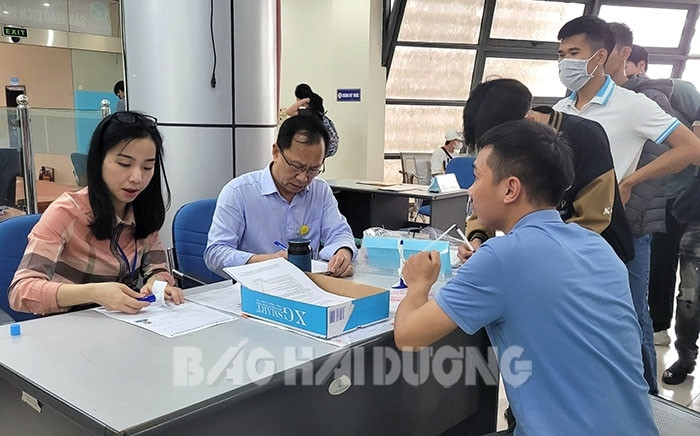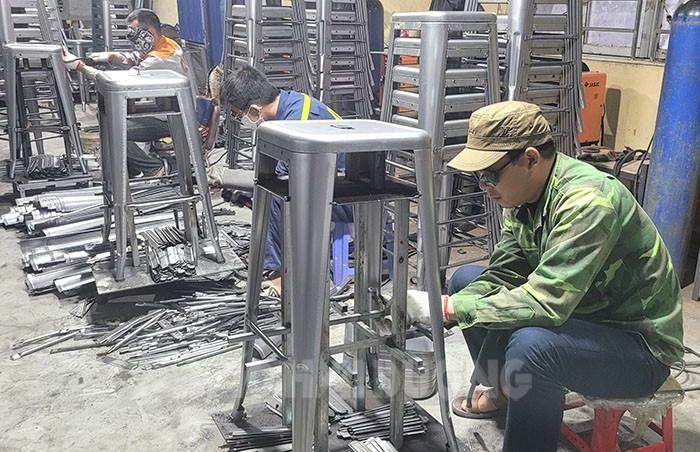South Korea is Hai Duong's second largest labor export market after Japan, but the rate of illegal workers residing here is the highest.

The Center for Employment Services and Vocational Education disseminates legal regulations to those who register to work in Korea.
In order not to lose this labor market, synchronous and drastic solutions are needed.
"Hold on"
“I have been in Korea for 5 years and still haven’t returned because of the debt burden. Many businesses in the province are also lacking jobs, but if I come back and can’t find a job and just hang around, it will be hard for my old couple,” Mr. NHT in Hoang Tien ward (Chi Linh) explained when his son, Mr. NTH, still “stubbornly” stays in Korea to work, even though his labor contract has long expired.
Many workers who run away stay in Korea to work after their contracts expire because the income there is many times higher than in Vietnam. If they accept to return, it will be difficult to continue working because passing the Korean language test is not easy. Moreover, many families have many members who go to Korea to work, get married and have children there, so they do not want to return...
The above reasons make Hai Duong still have many illegal workers residing in Korea. According to incomplete statistics of the Ministry of Labor, War Invalids and Social Affairs, by the end of 2021, Hai Duong still had about 700 Korean workers whose contracts had expired and had not returned home. In 2022, this number decreased but not much. Illegal Korean workers returning home are still trickling in. In early 2023, Chi Linh City was the only locality in the province that had to temporarily stop sending workers to Korea to work under the EPS program in 2023 because there were more than 70 illegal workers residing there.
Although the remaining localities of the province are not stopped from sending workers to Korea to work under the EPS program in the first phase of 2023, the number of illegal workers still remains. According to Mr. Tran Van Huu, Deputy Head of the Department of Labor, War Invalids and Social Affairs of Tu Ky district, one of the reasons why managing workers going abroad to work in general and Korea in particular is difficult is because the locality does not know the number of people going and returning to the country every year, so propaganda or supervision is not easy.

The fundamental solution for illegal non-resident workers in Korea is to create good jobs for them when they return home (illustrative photo)
Stronger solutions needed
In 2022, the Department of Labor, War Invalids and Social Affairs equipped more than 300 commune-level officials in charge of labor, war invalids and social affairs with skills and legal knowledge on sending workers to work abroad. In some areas with many runaway workers, the department's leaders assigned officials to closely monitor and seriously implement propaganda according to the motto of checking each commune, each village, and each house to mobilize.
According to Mr. Bui Thanh Tung, Director of the Department of Labor, War Invalids and Social Affairs, the return of illegal workers in Korea is important in building prestige and maintaining a large labor market. The unit has soon established an interdisciplinary working group with 24 businesses and establishments that send workers to work abroad, including the Korean market. Through these working sessions, the department can better grasp and monitor the compliance with legal regulations of foreign workers.
According to the experience of comrade Nguyen Huu Bien, Party Secretary and Chairman of the People's Committee of Quang Minh Commune (Gia Loc), the locality has recently significantly reduced the number of illegal workers because grassroots officials know how to mobilize "slow and steady wins the race", tapping into the psychology of returning home to start a business near their families. Illegal residents will have to suffer unfortunate consequences if they are unfortunately deported or have work-related accidents. At that time, their relatives will realize and voluntarily mobilize their children to return home. Propaganda is only a soft solution, but to prevent it more effectively, there must be strong solutions such as administrative fines, bail deposits, etc.
In late 2022, South Korea proposed stronger measures to crack down on illegal workers. These cases can be punished with up to three years in prison, fined up to 30 million won (over 500 million VND) and restricted from entering South Korea.
The prompt intervention of the commune-level authorities is also one of the effective solutions to prevent the locality from being included in the list of localities that have stopped recruiting workers to work in Korea. However, the low rate of illegal workers does not mean that the remaining localities are subjective. In fact, the number of workers who run away when their contracts expire is still there and the number of workers going to work in Korea is increasing. If the selection process is not done carefully and stronger measures are not taken, the risk of being banned from exporting labor is very likely to occur.
Furthermore, in order for localities to better manage workers working abroad, not just in Korea, the Ministry of Labor, War Invalids and Social Affairs needs to regularly send a list of workers who do not return home on time for local review. “In reality, there are many workers who have returned home but are still on the list compiled by the Ministry of Labor, War Invalids and Social Affairs, which is unfair,” said Ms. Nguyen Thi Dung, a labor, war invalids and social affairs officer in Tan Dan ward (Chi Linh).
Along with that, the province can consider issuing regulations requiring workers working abroad or returning to their locality to report to the local authorities. Only then can the population be managed as well as the supervision of workers working abroad be better.
THANH ANH
>>> Hai Duong workers going to work abroad under contracts increased sharply
>>> How long will Chi Linh be mentioned?
>>> South Korea - a potential labor export market for Vietnam